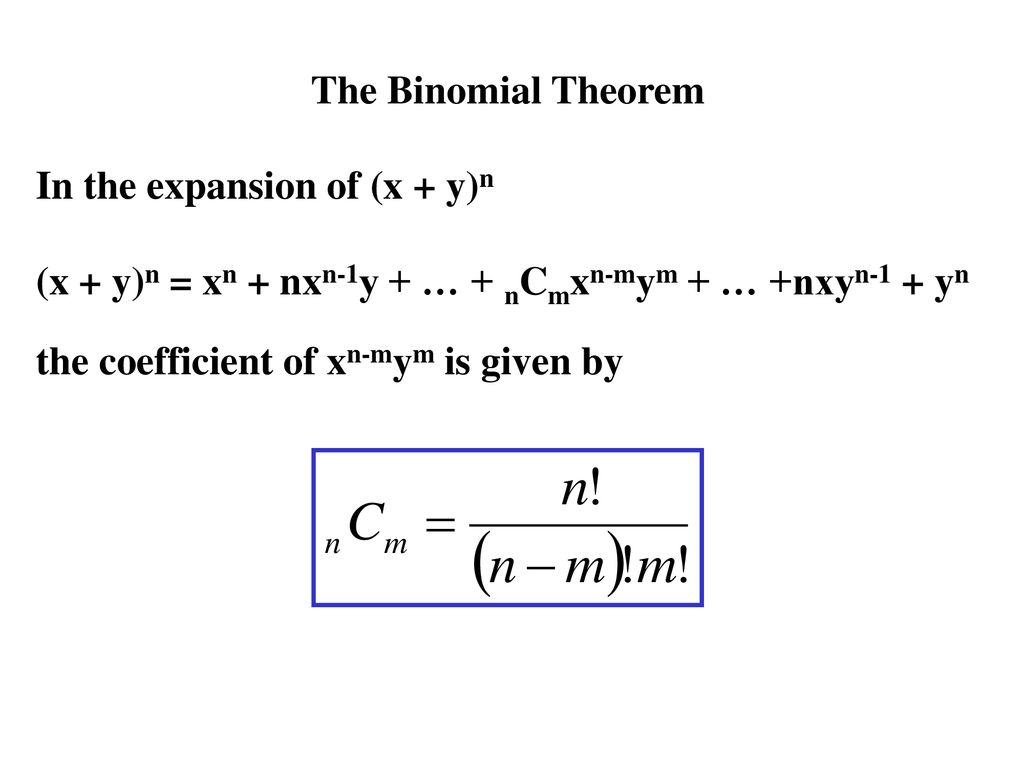With increasing power, expansions become lengthy and complex to calculate. If you have been finding this concept difficult, you are at the right place! However, with the Binomial Theorem, it is easy to calculate a binomial expression raised to an immense power. As a rule, the binomial Theorem (also known as binomial expansion) is simply written as:
For binomial experiments (events in which there are two possible outcomes, such as heads or tails), one uses the formula to determine the probability.
The Binomial Theorem: A Brief Introduction
An expression raised to any finite power can be expanded using the Binomial Theorem. In Algebra, probability, etc., the binomial Theorem is an important tool of expansion.
Binomial Expression: An expression involving two dissimilar terms is known as a binomial expression
Binomial Expansion
Important points to remember
- The total number of terms in the expansion of (x+y)n are (n+1)
- X+Y=n when their exponents are added together.
- nC0, nC1, nC2… nCn are also known by the name of binomial coefficients. These are represented as C0, C1, C2, ….., Cn
- Also, binomial coefficients that are equidistant right from the starting to the last are equal i.e. nC0 = nCn, nC1 = nCn-1, nC2 = nCn-2, etc.
What are important terms used in the Binomial Expansion
Most of the times, while solving a binomial expansion, it is often asked to calculate the general term or the middle term. Let us know the other terms which are there in a binomial expression.
- General Term
- Independent Term
- Numerically, the greatest term
- Ratio of Consecutive Terms/Coefficients
- Middle Term
- Determining a Particular Term
Binomials in Real Life
Experimental results with two possible outcomes are called binomial distributions. Trying things out, making a decision, or just rolling the dice can be considered experimenting. Success (or failure) is all they are. In other words, things happen or they don’t. What are my chances of living to 100? My car won’t start; will it start? My college tuition is due, can I pay it?
A scratch-off lottery ticket is a simple example.
One way or another, you’re going to win. If you want to buy a ticket, you need to know your odds of winning.
Other examples:
- There is either parking space available, or there aren’t.
- A Powerball winner either wins or doesn’t win.
- The partner gives you a gift, or he or she doesn’t.
- There are two kinds of drugs: those that cure and those that don’t.
- Computers either work or they don’t.
- Paychecks are either sent to you or not.
Before you buy a computer, you want to know if it will work. Hopefully, you hadn’t realized you were using binomials. Reviews might have been checked before you made a purchase. Almost all review sites offer ratings, but the majority of them are either positive or negative. A drug test to determine whether it cures a terminal illness, for example, becomes more important when life and death are at stake. Almost anything that leads to death is a binary, since both outcomes are possible.
Definition of Binomial Distribution
It must be described mathematically, of course. When you do an experiment, the binomial distribution describes what’s likely to happen. P and n are the variables.
- N: Number of times the experiment occurs.
- The probability that a certain outcome will occur.
The value of “n” becomes 30 after you roll 30 dice. It follows that n is 10 if you purchase ten lottery tickets. It is 1/6 of the time you will roll a number (like 4) on the dice. So p= (1/6). Lotteries are usually extremely unlikely to be won, with odds of approximately 1 in a million. As a result, p would be equal to (1/1 million).
Binomial Expansions and Series
In statistics, the binomial formula is mostly employed for counting and for calculating probabilities. Calculus uses a very similar method to simplify complex functions by rewriting them in binary form (binomial).
Conclusion
You must enrol in Cuemath.com, and see hundreds of videos up on all kinds of stats topics. The maths expert teaches you the basic of binomial expressions so that you master them. Comments and suggestions are always welcome.
